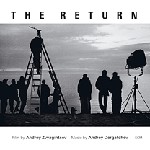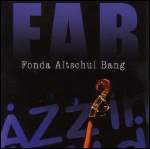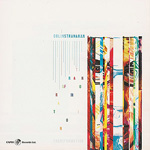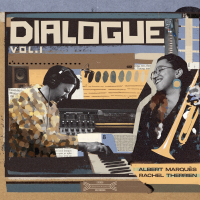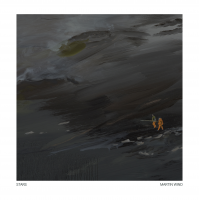Home » Jazz Articles » Album Review » Andrey Dergatchev: The Return
Andrey Dergatchev: The Return
Similarly, one can imagine Russian composer Andrey Dergatchev's score to Andrey Zvyagintsev's film The Return enhancing the visuals, something made possible by the inclusion of a number of stills from the film in the CD booklet. Combining everyday human interaction with everyday visuals that range from the starkness of nature to the clutter of the city, Dergatchev's score manages to blend the ancient with the contemporary, utilizing musical devices that spread equally across the temporal spectrum.
Dergatchev blends elements of ambient music, minimalism, gentle rhythms, spoken word, found sounds and melodic fragments, managing to somehow bring together disparate ideas in ways that not only make musical sense, but echo the paradoxical nature of the film as well. "Titles-Run joins drum programming and Armenian duduk, creating a timeless atmosphere that evokes feelings of antiquity and modernity while being neither in any direct sense. Plaintive and powerfully emotional without resorting to excess or melodrama, it's the most articulate example of the film's contradictions.
"Georgians mixes a haunting vocal sample—complete with vinyl ticks and pops—with a soft synthesizer wash, gradually layering snippets of varying lengths of the vocal sample, resulting in the same kind of magical confluence found on Brian Eno's Ambient 1: Music for Airports (EG, 1978).
Dergatchev's use of modern technology is so organic that when a soft, minimalist electric piano pattern blends with the sound of engines on "Port, it makes perfect sense. In many ways an extension of Eno's work, in particular Apollo: Atmospheres and Soundtracks (EG, 1983), Dergatchev's music for The Return should be considered less as a manifestation of traditional musical concerns, more as an enveloping audioscape. Film soundtracks are often presented as short and discrete sound bytes, but the beauty of The Return is that it's a more or less continuous fifty minutes of music, with its own emotional and narrative arc. It's not necessary to understand the occasional snippets of Russian dialogue to appreciate the general pervading melancholy.
"Final Titles is perhaps the most conventional of the score's seventeen pieces. Still, while the insistent drum program and vividly melodic theme make it the easiest and least amorphous piece to grab hold of, Dergatchev's visual approach to the music and his innovative ability to combine the most contradictory of sounds prevent it from ever becoming ordinary or commonplace.
The most enduring film scores stand on their own, and while this soundtrack to The Return clearly works to enhance the film's understated drama, it also has its own story to tell.
Visit Universal Classics on the web.
Track Listing
Underwater; Old Man; Shorty; In the Bedroom; The Road; Mugam; Titles-Run; Japan; Bekhtovo; Port; Mozart; Rehearsal; Culmination; Piano; Georgians; FInal Titles; Rain.
Personnel
No Personnel Listed.
Album information
Title: The Return | Year Released: 2006 | Record Label: ECM Records
Tags
PREVIOUS / NEXT
Support All About Jazz
 All About Jazz has been a pillar of jazz since 1995, championing it as an art form and, more importantly, supporting the musicians who make it. Our enduring commitment has made "AAJ" one of the most culturally important websites of its kind, read by hundreds of thousands of fans, musicians and industry figures every month.
All About Jazz has been a pillar of jazz since 1995, championing it as an art form and, more importantly, supporting the musicians who make it. Our enduring commitment has made "AAJ" one of the most culturally important websites of its kind, read by hundreds of thousands of fans, musicians and industry figures every month.


